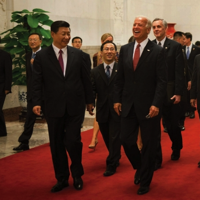It is amusing to hear U.S. politicians of all ideological stripes sounding like classic libertarians as they proclaim that, in these times of fiscal austerity, the United States should no longer act as the "world's policeman" and that other countries should be contributing "their fair share" to global security. Nevertheless, the many studies undertaken by the fellows of the Cato Institute, a libertarian think tank, detailing how the United States can shift to becoming an "offshore balancer," thereby reducing its footprint around the world, and how our European and East Asian allies can afford to do more in the service of their own defense, continue to gather dust on the shelves, with no sign that either the Congress or the executive branch is really interested in implementing them.
The gap between rhetoric and reality could soon lead to an untenable situation. As Stephen Glain puts it, "The commitment to project force across every strategic waterway, air corridor and land bridge has exhausted the U.S. military and will be even harder to sustain as budget cuts force strategists and logisticians to do more with less. A national discussion about the logic of maintaining huge forward bases, to say nothing of their financial and human costs, is long overdue."
Historically, when faced with severe financial and resource constraints, major powers have begun a process of shrinking commitments and making very clear distinctions between vital interests and secondary ones. An example is Britain's decision to abandon its positions "east of Suez" during the government of Prime Minister Harold Wilson. Indeed, there are several different, competing approaches available to the United States, such as hemispheric consolidation or a focus on the Pacific basin, with a corresponding downgrade to the European and Middle Eastern theaters. Yet official Washington is loath to undertake this process. Reducing U.S. obligations abroad in order to rebuild America's economic and technological base of strength at home is a goal that candidates often cite on the campaign trail and one that enjoys tremendous popular support. But it is quickly forgotten once zealous campaigners have become officeholders comfortably ensconced in Washington. Time and again, the U.S. has demonstrated its unwillingness to prioritize its foreign policy interests. By claiming that all our interests are in one form or another vital, we render the very word itself meaningless.

